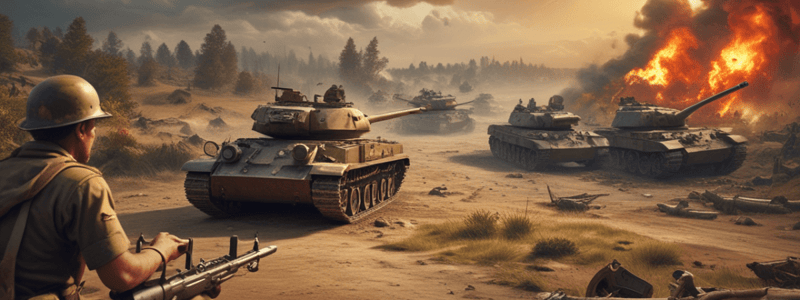Podcast
Questions and Answers
The Battle of the Bulge was the first major German offensive on the Western Front.
The Battle of the Bulge was the first major German offensive on the Western Front.
False (B)
World War II resulted in significant social changes, including the increased role of women in the workforce.
World War II resulted in significant social changes, including the increased role of women in the workforce.
True (A)
Joseph Stalin was the leader of Nazi Germany during World War II.
Joseph Stalin was the leader of Nazi Germany during World War II.
False (B)
Japan officially surrendered on September 2, 1945, marking the end of World War II.
Japan officially surrendered on September 2, 1945, marking the end of World War II.
The United States dropped atomic bombs on the Japanese cities of Tokyo and Osaka in 1945.
The United States dropped atomic bombs on the Japanese cities of Tokyo and Osaka in 1945.
Adolf Hitler rose to power in 1933 and led Germany during World War II.
Adolf Hitler rose to power in 1933 and led Germany during World War II.
The Treaty of Versailles imposed heavy reparations on Germany after World War I.
The Treaty of Versailles imposed heavy reparations on Germany after World War I.
The Battle of Midway was a significant victory for Germany in the Eastern Front of World War II.
The Battle of Midway was a significant victory for Germany in the Eastern Front of World War II.
The Axis Powers represented the democratic nations during World War II.
The Axis Powers represented the democratic nations during World War II.
The aggressive expansionist policies of the Axis Powers led Britain and France to declare war on Germany in 1939.
The aggressive expansionist policies of the Axis Powers led Britain and France to declare war on Germany in 1939.
Flashcards are hidden until you start studying
Study Notes
World War II
Overview
World War II was a global conflict that lasted from 1939 to 1945. It involved multiple alliances called the Allies and the Central Powers. Forged through a series of alliances called the Tripartite Pact and the Axis Alliance, these two factions ultimately represented the democratic nations and the totalitarian powers, respectively. Some of the major causes of World War II were the Treaty of Versailles, the rise of totalitarianism, and the aggressive expansionist policies of the Axis Powers.
Causes of World War II
The aftermath of World War I led to the signing of the Treaty of Versailles, which imposed heavy reparations on Germany. This harsh settlement increased political tensions within Germany and contributed to the rise of Adolf Hitler, who came to power in 1933. Hitler's aggressive expansionist policies led to the annexation of Austria and the Sudetenland, which was part of Czechoslovakia. This, in turn, led Britain and France to declare war on Germany in September 1939.
Major Battles of World War II
Some of the major battles of World War II were:
-
Battle of Stalingrad (1942–43): This battle was a turning point in the Eastern Front, as the Soviet Union managed to hold off the German forces and eventually push them back.
-
Battle of Midway (June 4–7, 1942): This naval battle was a significant victory for the United States, as it turned the tide of the war in the Pacific in their favor.
-
D-Day (June 6, 1944): Also known as the Normandy Landings, D-Day was a high-risk operation in which Allied forces landed on the beaches of Normandy, France, to establish a foothold in Europe and eventually defeat Nazi Germany.
-
Battle of the Bulge (December 16, 1944 – January 25, 1945): This was the last major German offensive on the Western Front and resulted in heavy losses for the Germans.
-
Battle of Okinawa (April 1–21, 1945): This was the largest amphibious assault in the Pacific Theater, and it resulted in the capture of the island of Okinawa from the Japanese.
Impact of World War II on Society
World War II had a profound impact on society:
-
Economic Changes: The war led to a massive increase in government spending, which stimulated the economy and led to technological advancements.
-
Social Changes: World War II brought significant changes to the role of women in society, as they were called upon to work in factories and in other roles previously reserved for men.
-
Political Changes: The war led to the establishment of the United Nations, which aimed to promote peace and international cooperation.
Key Leaders of World War II
Some of the key leaders during World War II were:
-
Adolf Hitler: The leader of Nazi Germany who led the country into war and implemented genocidal policies against Jews and other minority groups.
-
Joseph Stalin: The leader of the Soviet Union who oversaw massive industrialization and military expansion to counter the threat of Nazi Germany.
-
Franklin D. Roosevelt: The President of the United States who led the Allied forces and implemented policies to support the war effort, including the introduction of the Lend-Lease Act.
Timeline
Here is a brief timeline of World War II:
-
September 1, 1939: Germany invades Poland, leading Britain and France to declare war on Germany.
-
June 22, 1940: France signs an armistice with Germany, effectively ending the Battle of France.
-
December 7, 1941: Japan attacks the United States naval base at Pearl Harbor, Hawaii, bringing the United States fully into the war.
-
June 6, 1944: D-Day, the largest amphibious assault in history, takes place, with Allied forces landing on the beaches of Normandy, France.
-
August 6 and 9, 1945: The United States drops atomic bombs on the Japanese cities of Hiroshima and Nagasaki, respectively.
-
September 2, 1945: Japan officially surrenders, marking the end of the war.
Studying That Suits You
Use AI to generate personalized quizzes and flashcards to suit your learning preferences.




